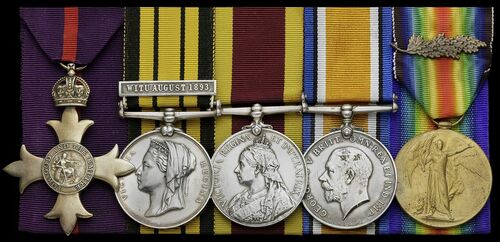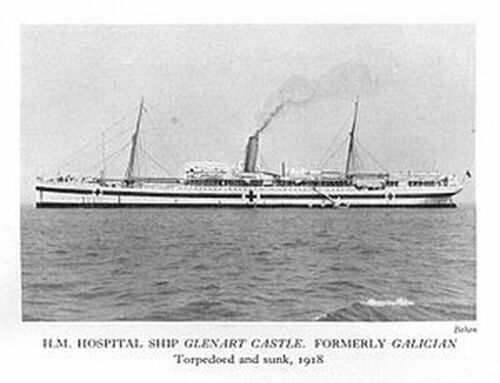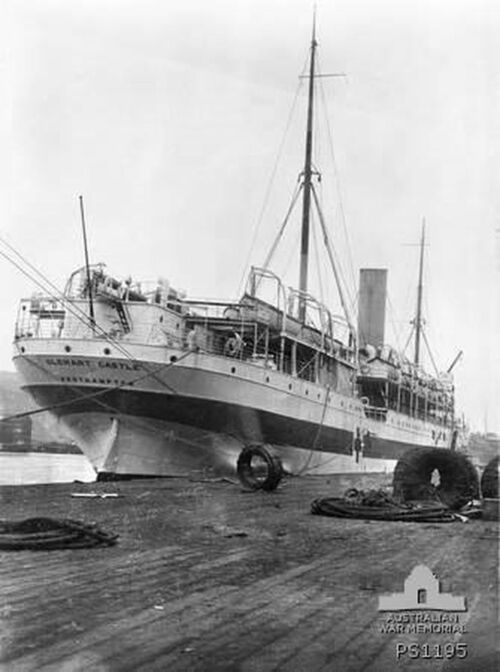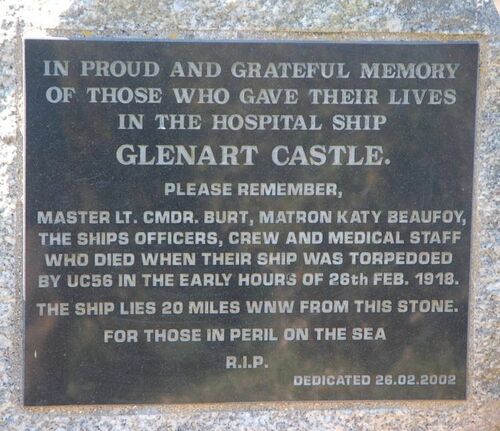Auction: 23001 - Orders, Decorations and Medals
Lot: 344
'I submit that the greatest credit is due to Captain Day (Master of the Ship) and Major Home R.A.M.C., and all those on board the Glenart Castle, for the splendid way in which they got all the wounded safely out of the ship in spite of being in darkness'.
The testimony of Admiral The Hon. Stanley Colville to the Court of Inquiry on the mining of the Glenart Castle on 1 March 1917, refers
The superb O.B.E. group of five to Lieutenant-Colonel W. E. Home, Royal Army Medical Corps, late Fleet Surgeon, Royal Navy, whose colourful and eventful career took him through East Africa and China with the Royal Navy
Unable to re-join due to his age and determined to serve, he was to join the Royal Army Medical Corps and proved invaluable in the evacuation of the Glenart Castle on 1 March 1917
The Most Excellent Order of the British Empire, Military Division, 1st Type, Officer's (O.B.E.) breast Badge, silver-gilt; East and West Africa 1887-1900, 1 clasp, Witu August 1893 (W. E. Home, Surgn R.N., H.M.S. Swallow.); China 1900, no clasp (St. Surgn. W. E. Home, M.D. R.N.); British War and Victory Medals, with M.I.D. oak leaves (Major W. E. Home.), minor contact wear overall, very fine (5)
Ex-Douglas-Morris collection.
O.B.E London Gazette 3 June 1919.
William Edward Home was born in Dublin on 21 June 1860, the son of an Army Surgeon. Qualifying as a Surgeon he was posted to Duke of Wellington on 20 August 1885. Served in this role with a number of institutions and ships including Alexandra, Wildfire and Thrush. Home was posted to the Nymphe-class sloop Swallow on 24 October 1892 he was still with her when she joined the Second Witu Expedition in August 1893.
The first expedition had abolished slavery and reduced Witu to a protectorate of Zanzibar under a puppet ruler. However, Sultan Fumo Omari - brother of the puppet Sultan Fumo Bakari - resisted this new status quo by force, leading to the formation of a new expedition. One of the vessels chosen to participate was the Swallow, alongside Blanche, and Sparrow. An attempt to negotiate failed and a force of Royal Marines moved to storm the rebel held towns. In the heavy fighting there were several casualties, including Privates Sparrowhawk (for his Medal, please see Lot 32) and Coombes (for his Medal, please see Lot 31). Home was notable in his efforts to treat those wounded in the engagement. He makes an appearance in the journal of Surgeon Lilly who has him escorting the wounded to the coast and supervising their immediate care and transport to the French Hospital in Zanzibar.
Continuing his service with the Royal Navy Home passed as a Staff Surgeon on 13 January 1894 while still with Swallow. However, he did not actually serve in the role until 20 August 1897 with H.M.S. Tamar. Posted to Centurion, Home arrived with her on 1 July 1900. He took transport to - and back from - China aboard the Jelunga. In this position his Medal was uniquely named to the ship.
Arriving back in Britain he moved from Centurion to Duke of Wellington on 2 December 1900. Promoted Fleet Surgeon on 9 October 1903 he served largely ashore in this rank fetching up at Pembroke in April 1911 as Medical Officer for London (East) Recruiting District. Notably in performing this role he had Medical Charge of the West India Docks Store Depot. Having seen many years of service at this point Home was living comfortably in Greenwich with his wife Ida Mary Home (nee Richardson) at this time.
Home's final movements before the Great War are hard to follow however the University of Edinburgh roll of honour records that he joined the Royal Canadian Navy in 1914, serving in the hospital at Esquimalt. On the outbreak of the Great War he did not get the call to mobilise from the Royal Navy which may have factored into his decision to join the Royal Army Medical Corps as a Major on 12 December 1916.
Travelling aboard the Hospital Ship Glenart Castle on 1 March 1917, Home was doubtless engaged in tending to the casualties being conveyed from Le Havre to Southampton when an explosion shook the vessel at 2340hrs. The dynamo and Marconi installation were both knocked out leaving the vessel without power and unable to signal for help. Glenart Castle soon began to sink fast astern and the crew set about lowering boats into the water as the medical staff prepared their charges for the dangerous business of abandoning ship. In the pitch dark, without power and with the responsibility of their wounded companions hanging over their heads the staff worked wonders. Not only did every patient, crewman and staff member survive but at the eleventh hour a rescue part of tugboats arrived and managed to salvage the sinking ship. Sadly, however it was but a short reprieve as she was torpedoed on 26 February 1918 with the loss of 153 Officers and men, although it seems that Home had left the ship at that stage. Despite this he received a 'mention for his services (London Gazette 6 September 1918, refers) with the citation stating:
'The names of the undermentioned have been brought to the notice of the Secretary of State for War for valuable services rendered on the occasion of the sinking or damage by enemy action of Hospital Ships, Transports and Store Ships.'
Retiring after demobilisation Home died at Tonbridge, Kent on 9 June 1935 at the age of 75; sold together with copied research comprising London Gazette extracts, M.I.C. and a medal roll as well as reports on the loss of the Glenart Castle and a Royal Naval Record of Service.
Subject to 20% VAT on Buyer’s Premium. For more information please view Terms and Conditions for Buyers.
Sold for
£1,300
Starting price
£320











